
views
Learning to Let Go

Stop seeing failure as a measure of your self-worth. Failing can lead to sadness and frustration. Perhaps you anticipated success or feel embarrassed that the situation didn't pan out; however, failure is not a measure of your worth or value as a person. You are not dumb because you failed one exam. You are not weak because you lost one karate match. Use this moment for push forward rather than giving up. Believe that you are resilient and can bounce back from failure. Often your harshest critic is yourself. See your self-worth through your ability to keep trying rather than giving up. While you may not be good at one thing, that doesn't mean that you're bad at everything.
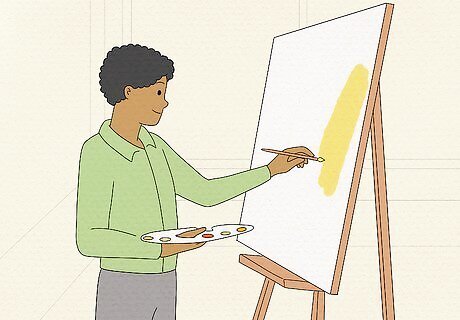
Focus on what you do well. After failure, you may feel like there's nothing good about you. But in truth, everyone has something unique to them that they do well. Some people are good listeners. Some are handy with fixing things. Some are dependable. Some are artistic. Use what you do well to your advantage in the future. While it is important to improve things about yourself, it is also important to keep those good things strong. Avoid overly negative thinking by focusing on the positive aspects of yourself and your life. Think of three things that are going well in this current moment.
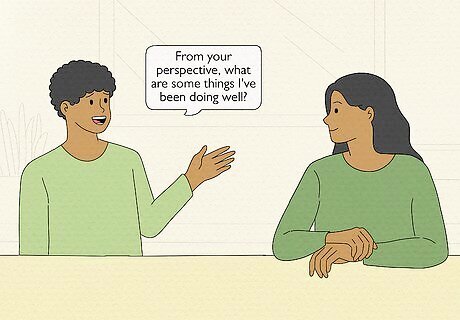
Seek guidance from those you trust. Don't let others determine your worth and value. Avoid listening to negative people or those who bully you to get what they want. When looking for guidance, trust those who care about and who are a dependable part of your life. Some friends or family may offer healthy criticism. Avoid dismissing it, but also ask them to focus equally on the positives as well as the negatives. Consider saying, "Thank you very much for the advice. I will take it to heart. I was also wondering, from your perspective, what are some things I've been doing well?" By opening up about your failing to others, you will feel less burdened or alone. It can be a very important step to letting go of your negative feelings. Chances are these people will have plenty of stories about their own failures, too.

Accept your limitations. The only person that you can control is yourself. You may have had to forfeit a match after you accidentally got injured beforehand. You may have submitted a team project that failed to meet expectations because one of your team members didn't do the work. Your company may have failed to reach its goal of serving more than 500 clients due to a lack of resources. By learning to distinguish what you can change, and what you can't, you can better understand how external things can impact your life. Take this as an opportunity to focus on what you can do. For example, failing to get to work on time due to extreme weather circumstances may have been out of your control. Yet, failing to get to work on time routinely due to time mismanagement may have been within your control. When looking at a recent failure, consider writing down two lists, side by side. One side includes the things that you can change about yourself or your situation. The other side includes the external forces that you cannot control.
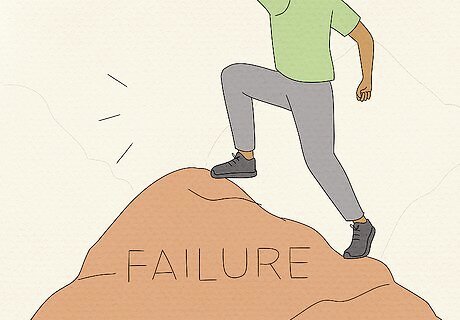
Define failure as only temporary. Failure is a loss, but avoid looking at this loss as permanent. Failure happens at various points in our lives. These points are temporary moments or small snapshots in the larger scope of your month, year, or lifetime. By seeing failure as temporary, it will seem less overwhelming. It will feel like a small hill rather than a huge mountain. When something is temporary, that means that it is more likely to adapt or change. Thus, failure can become a positive thing as times change.

Learn to anticipate failure. Accept that it can and will happen at some point. This doesn't mean that because failure exists, then the best way to avoid it is to not try your best. Anticipating failure means that you have considered different scenarios. It means that you are flexible about what happens — whether you succeed or fail. Think about the possibility of failure in any situation. See it as a way to be motivated to be more organized, more thorough, and more engaged. Consider the scenarios in which you both win and fail. Imagine how you might react. Plan accordingly. Focus your energy on how to be positive and stay motivated no matter the outcome. Making back-up plans can help you avoid a fear of failure. If you can anticipate failure and have a plan B and C, then you can more successfully face the prospect of failure with less fear.
Finding Inspiration

Use failure as inspiration. Sometimes failure can make you work even harder, and give you the motivation to push yourself further. Use each mistake as a way to build strength and courage. By embracing failure, you will become more comfortable with it as a part of your life and work. Think about the most difficult challenge that you have overcome. Use this as motivation that you can overcome what's happening now. Use failure as wisdom for the future. When you look back in a week, month, or year from now, you may feel stronger for having faced your failures. Remember this as a way to embrace failure: "Tis better to have loved and lost than never to have loved at all."

Learn from mistakes. Who doesn't make mistakes at some point in their lives? While mistakes are things that happen, it is about what we learn from them that matter. We can't take back the past, but that doesn't mean that history is going to repeat itself. Try thinking of mistakes as experiments. You won't know whether or not something works unless you try it. And if you try, and it is a failure, then now you have more information moving forward. Place the importance on what you learned, rather than what was. When something doesn't work, you become more informed about what might work in the future. Find people that support you. Listen to their advice about what to learn from this experience. If you're on a sports team, your coach and fellow players may have helpful advice about what to do. Think about how many famous businesspeople, inventors, artists, and scientists all had failures before they had success. They learned from their mistakes, and kept going. Oprah Winfrey Oprah Winfrey, Entertainment Mogul Failure is where you learn. "Do the one thing you think you cannot do. Fail at it. Try again. Do better the second time. The only people who never tumble are those who never mount the high wire."
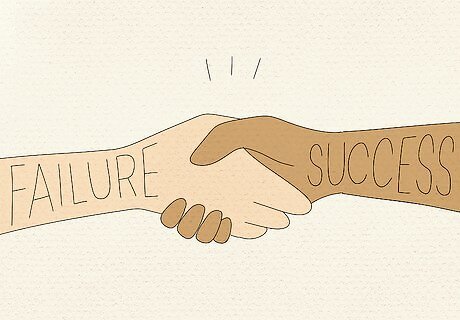
Focus on how failure and success go hand-in-hand. If you never try, then you never succeed. Perseverance is key to many successes. Few people succeed by sheer luck. You often have to work hard and avoid letting others determine your fate. While your measures of "success" may not always be attainable, that does not automatically mean that you have failed. Many athletes, scientists, and business tycoons will all tell you the same thing: failure is a part of what makes you successful. You will learn more from the hard failures than from the easy successes. You will actually be stronger and more resilient from those failures.
Preparing Yourself for Next Time

Focus on the future rather than the past. If you see failure as an opportunity to get closer to your goal, then it becomes something to be expected and even anticipated. In all likelihood, if you're not failing, then you're probably not pushing yourself enough. Be future-oriented rather than dwelling on the past. While the past can help you to understand what to do better, fixating on past mistakes will deter you from seeing the possibilities for the future. Don't let fear of failure determine your future fate. Believe that the willingness to try new things and learn from them will help you grow in the future. See your future goals as challenges. You likely will find greater reward when doing something difficult rather than something easy.
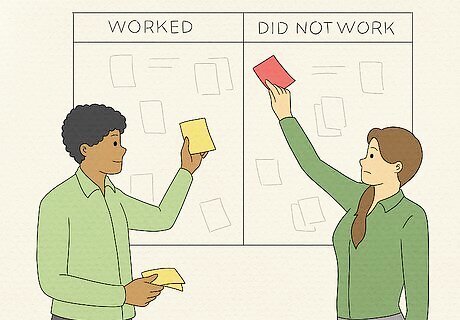
Evaluate what worked and what didn't. Assessing what happened shouldn't be about your character flaws. Take an objective look at what occurred, and focus on what you can do better for next time. Depending on the situation, utilize your co-workers, teammates, friends, and family to help you get a different perspective. Review the challenges that occurred even before the failure. For example, let's say you had a team project with three other people, and this project ended up failing to meet your teacher's or company's expectations. Assess how the team could have communicated more effectively. Determine which aspects of the project were lacking and how they could have been improved. Evaluate external forces that your team could not control. Avoid blaming yourself for all the problems, or blaming others for a mistake that you took part in. Be respectful to yourself and others regardless of the success or failure. This review process should help you to prevent or decrease mistakes in the future. While finding solutions to your mistakes may not be easy or fun, it will help to prepare you for next time.

Own up to your own faults. Being accountable for your actions is an admirable quality in life and at work. It means that you embrace your own part in a difficult situation. Taking ownership of what you can do to improve or change will help others to see you as a flexible and resilient person. By taking ownership of your own faults, it shows that you are mature. If you avoid admitting wrongdoing, you may lose out on an opportunity to move forward with your work, team, or situation. While it can be uncomfortable to admit fault, it may be worse when you avoid doing so.
Using a GRIT Strategy

Have Guts. Be courageous. Take risks. Risk means the possibility of failure. You need to have guts in order to do things outside of what’s easy or your comfort zone. It takes guts to ask someone out for a date. Don’t give up because one person says no — ask somebody else you like! It takes guts to start your own business. Small businesses and start-ups have a high risk of failure. But your product also might lead to the next best thing.

Be Resilient. Being resilient means the ability to bounce back from failure. You might feel depressed or upset with yourself. You may feel like giving up. But with resilience, you look on the brighter side, since you have these three traits: Optimism. You strive to do better. Confidence. You believe in yourself. Creativity. You have a plan for how to improve.

Take Initiative. When you take initiative, you’re forcing yourself to do something that’s hard. If you’re on a team project, and you’ve already failed once, you can take the initiative to make improvements and admit faults. That way, instead of beating yourself up about the situation, you are a leader for yourself and for others. Find out what you can do better by asking others about your strengths and where there is room for improvement. Be a support for those around you. When you’re helping others, you’ll feel less like a failure.

Be Tenacious. Persistence is key. Life is about trial and error. Whether in your studies, career, or personal life, having tenacity will make you stronger and wiser for the failures ahead. It means that you don’t give in.




















Comments
0 comment